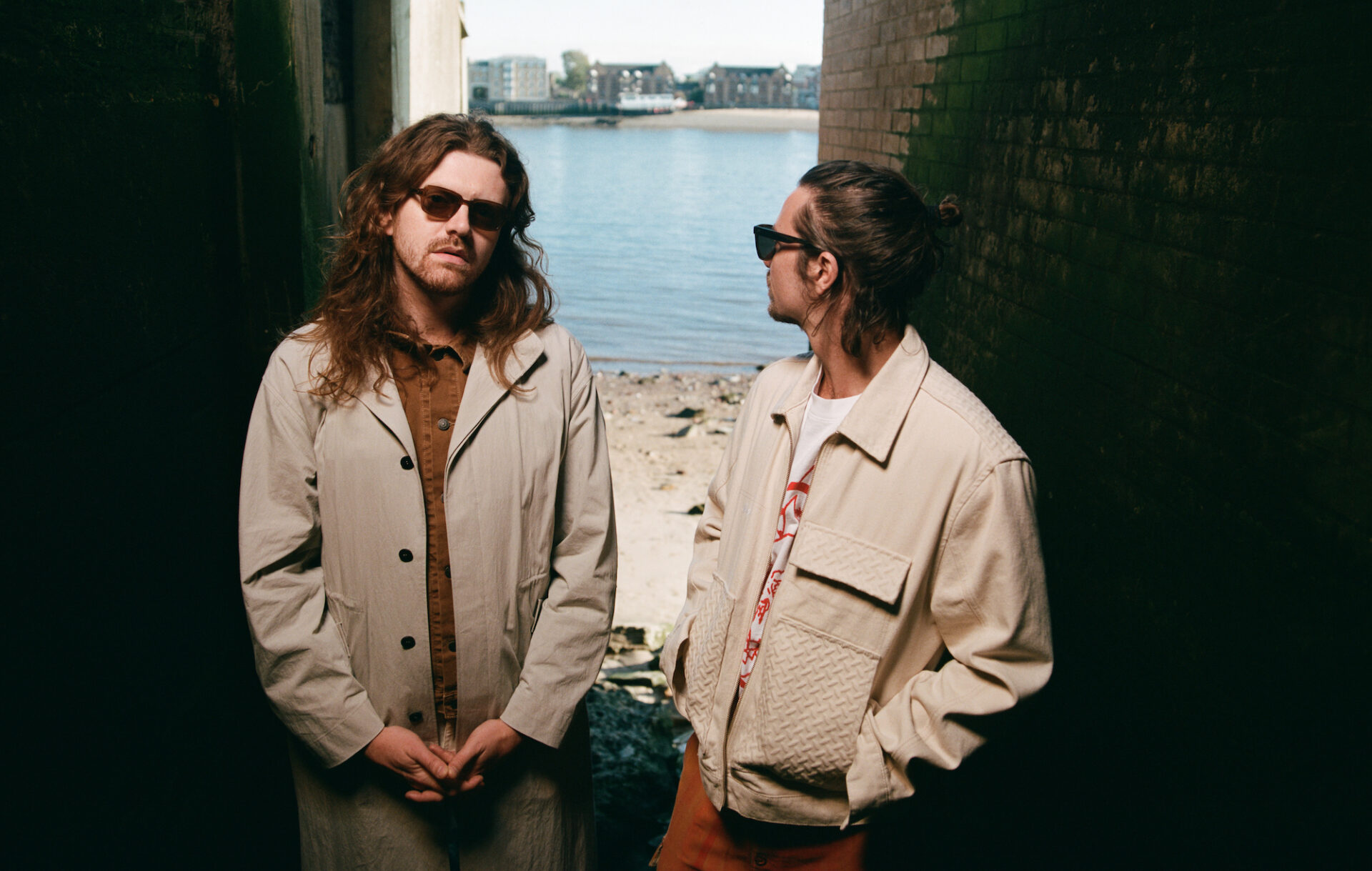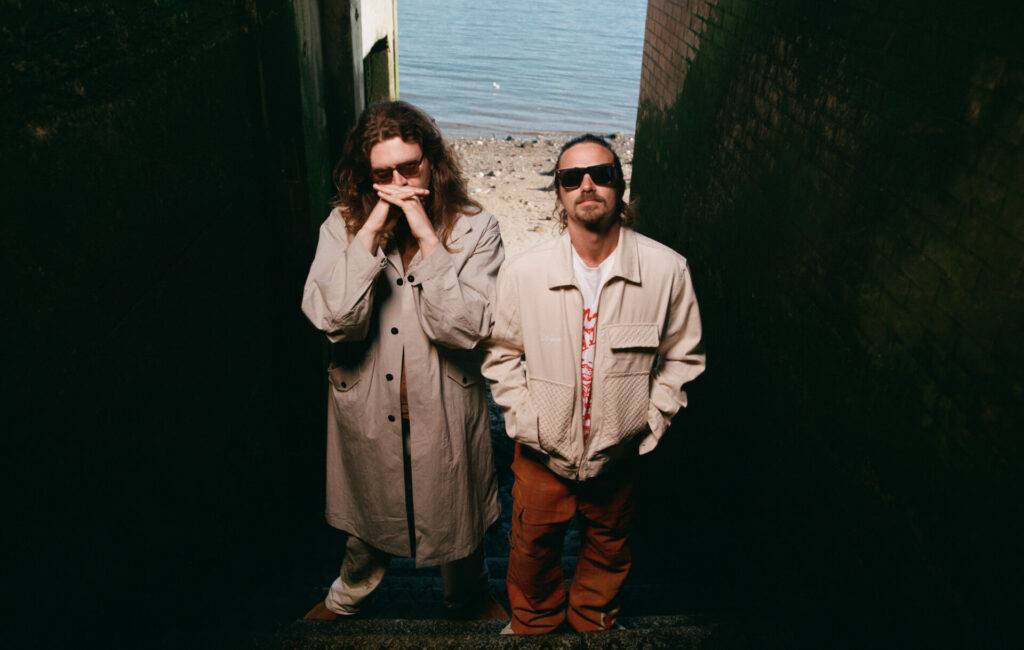Joy Anonymous: ‘We’re trying to bring people together’
The dance duo discuss their new album ‘Cult Classics’, recording in Imogen Heap’s house and keeping their community ethos alive.

If you headed down to London’s South Bank for your daily walk during the COVID lockdowns, you might have stumbled upon something quite extraordinary happening. At the start of the pandemic, Joy Anonymous – childhood friends Henry Counsell and Louis Curran – decided to set up shop on the riverbank and play impromptu sets for those wandering by during their government-mandated period of exercise. NHS staff and other key workers also passed by on their way to or from work.
The pair kept returning each night as word spread and interest grew, and by the time they played their fifth show in a row, over 300 people had gathered to let loose and exorcise the frustrations and fear of the current moment. “We were making tunes in our flat and decided to just go outside and make tunes outdoors because we were so fed up of being inside,” Counsell says. “We played until the speaker batteries ran out.”
Since then, Joy Anonymous have hosted over 100 pop-up raves of this type at the South Bank and beyond – they call them “meetings” – with a core message that has remained the same. Inspired by Counsell’s work supporting friends through Alcoholics Anonymous programmes, they wanted to provide the same opportunities for emotional purging, all tied together by one word: joy.
A moment at one of the South Bank shows gave the duo’s debut album Human Again its artwork. In it, a friend of theirs is seen interlocking his hands in a sign of unity. The cover to new album Cult Classics, out this week, was taken at a festival the band recently played and sees an entire crowd making the same gesture as one.
“It’s telling this story of that growth,” Curran explains. “It symbolises how we all came together. Using it as the artwork connected it all, and it couldn’t be more of what we’re trying to preach with our music.”
As they release their second album, Joy Anonymous tell Rolling Stone UK how they are keeping the same energy of their South Bank raves while playing arenas, changing their creative process, and making the album at Imogen Heap’s house.

You’ve played huge arena shows this year with Fred again.. and others – did that affect the overall sound of Cult Classics?
Counsell: We’ve been DJing more and playing bigger rooms though, so the album definitely knocks more than Human Again. Human Again was reflective of us sitting on the South Bank and doing these long sets, but this album has come from us being indoors again.
Curran: We don’t just want to become a couple of house DJs though. We’ve always valued melody and harmony, so it’s a balancing act. We’re never going to play just big room techno stuff.
Counsell: It’s all about songwriting and having a love of the craft of what a song is.
What was it like recording Cult Classics at Imogen Heap’s house in Essex?
Counsell: It’s exactly the type of house you’d imagine Imogen Heap to live in! Books that open doors, beautiful staircases, massive drawing rooms. We were there for two weeks, and every day more people were coming in and out.
Curran: It can sleep 12 people, and people would stay for a night or two nights. All these different combinations of people would drop in. Our Turkish guitar playing friend Emir was there, and then suddenly The Blessed Madonna would walk in. It was these crazy little rooms of amazing crossovers, which I think you can hear in the music.
Counsell: That was the start of the album, and then we spent the best part of a year playing it out and about and tweaking and honing it. We really reacted to how the crowd responded to the new songs at all the Joy meetings and then changed the songs based on that.
Did this environment change how you made the music compared to your debut album?
Counsell: It was completely different to how we’d worked music before. To be honest, we always try and change our process and we walked in there knowing there were loads of instruments there, and knowing which musicians were coming, but not planning anything beyond that. There was a living room upstairs with a beautiful piano and then the studio downstairs. We’d start every day with Lou upstairs making these loops that definitely weren’t dance music, more classical and jazz stuff. He would then bring them down and we’d flip them [into dance songs] in the studio downstairs. We were making our own samples.
Curran: We set up a mic in the middle of the room and had all these people coming in and playing percussion, guitar, piano, vocals, whatever they wanted. There’s a lot of live texture in a lot of the album because of that.
Counsell: In general, that’s what we like. We don’t listen to a lot of dance music in our everyday lives, but we listen to songs with natural textures. We wanted to input that into the dance music. It was also inspired by how people have sampled old records in the past, so we thought we would create our own samples and give it a whole new context and a deeper process.
And how did the album change after you workshopped it at raves and gigs?
Curran: It definitely feels more celebratory than Human Again. The first album was introspective and documenting the time of lockdown, but this one is the soundtrack of coming out of that and celebrating that it’s done. We’re trying to bring people together again.
Counsell: Even the subjects of what the songs are about comes to that. Lyrically, it talks a lot about moving forwards.
Now you’re playing bigger shows, how do you plan to keep the spontaneous and community-led vibe of your beginnings alive?
Counsell: Even when we are playing these big rooms, we always try and go and play these mad places in between. When we did four shows with Fred again.. at Ally Pally, we still went and did a South Bank on our day off. We played in Lithuania earlier this year in this converted prison. As we grow, we’re just trying to do those meetings in different places and to different people.
Curran: If we’re doing a festival abroad, we’ll try and do an afterparty in a tiny little cafe or something rather than doing the official festival afterparty in a club. We’ve also got a WhatsApp group with all the fans, and that stuff is always going to be a part of our DNA.
